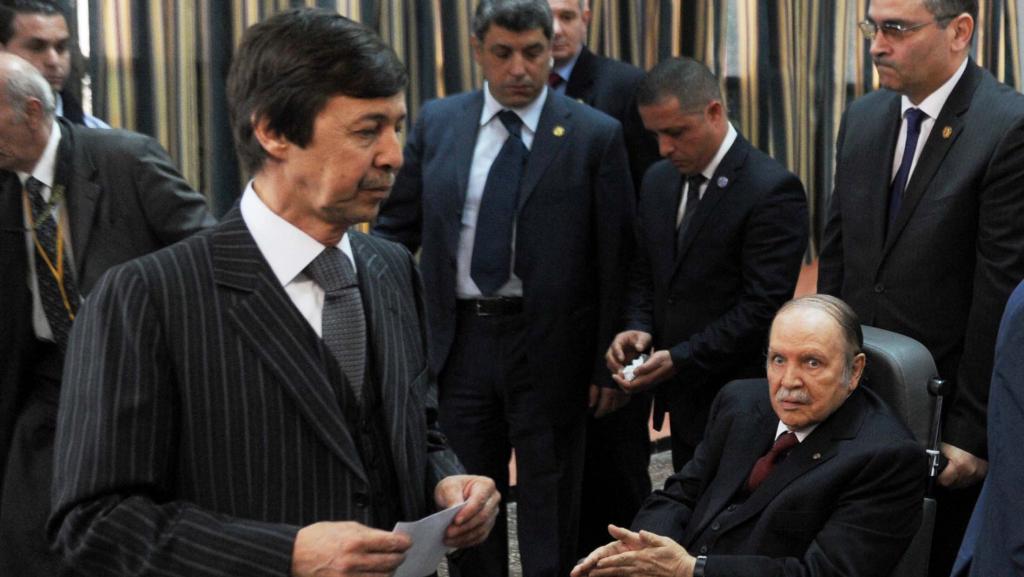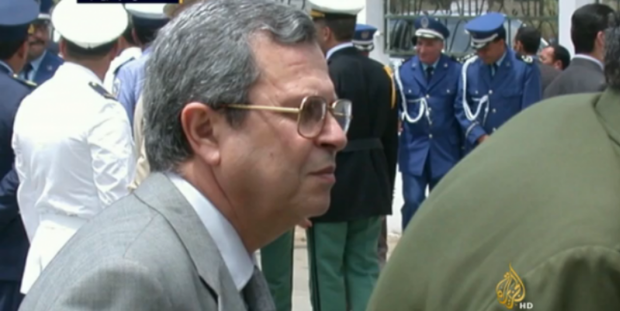
When he was reelected to a dodgy fourth term in April 2014, Algerian voters knew that Abdelaziz Bouteflika, now aged 79, was ailing.![]()
Though he easily dispatched a former prime minister, Ali Benflis, who officially won just over 12% of the vote, most of the opposition simply boycotted the last vote. During the 2011 Arab spring protests and beyond, Algerians have generally been more willing to tolerate Bouteflika’s hold on power because of the stability that his regime brought after a decade of civil war.
Aides claim the president’s faculties are intact, despite a stroke three years ago that left him unable to speak. Nevertheless, it’s clear — and has been clear for some time — that there’s an internal struggle between Bouteflika’s camp and the Algerian military about his ultimate successor.
* * * * *
RELATED: Bouteflika headed for controversial fourth term
* * * * *
Last year, Bouteflika sidelined Algeria’s top internal security official, Mohamed Mediene, a move widely seen as a setback to the military’s involvement in Algerian domestic politics and, accordingly, any succession after Bouteflika’s resignation or death. It was a shock at the time, considering that Mediene, also known as ‘Toufik’ and commonly referred to as the Dieu de l’Algérie, or the ‘God of Algeria,’ had been a fixture within the country’s power elite for more than two decades as the head of the Department of Intelligence and Security (DRS), the Algerian intelligence agency since 1990.

Bouteflika’s next step came earlier this week, with his administration apparently set to reorganize the DRS altogether. If successful, Bouteflika will have dismantled one of the institutional pillars of the military’s power, thereby transferring the country’s intelligence apparatus, which plays a role in domestic as well as international affairs, from the military to the presidential camp.
With so much at stake, the Algerian military may not simply accept such a sweeping adjustment of power, and its leaders may be biding their time to strike in a post-Bouteflika struggle. But it means that Bouteflika’s camp is very serious about controlling the post-Bouteflika transition in as orderly way as possible — and in a way that leaves the presidential regime, and not military or DRS leaders, in charge.
His brother’s keeper
The most likely successor? For now, it might be Saïd Bouteflika, who will argue that he represents the most seamless transition, thereby guaranteeing Algeria’s continued stability.
So what do we know about Saïd?
He’s only 58 years old, and he is a Paris-trained academic who received his Ph.D. from Pierre and Marie Curie University in the 1980s. He returned to Algeria in the late 1980s as a teacher and academic, though he has served as a special adviser to the president since his brother’s accession to the office in 1999. He is said to have been the enforcer of Algeria’s media blackout when his brother first suffered his stroke, but he otherwise holds a mysterious and discreet hold on power.
But Saïd is not nearly as popular as his brother, and he has been linked to corruption, even (however gingerly) in the Algerian press — perhaps as a result of DRS or military officials.
A growing civil society?
Moreover, Ali Haddad, a leading businessman who bankrolled Bouteflika’s 2014 reelection campaign, may have designs on taking power himself after forming a new political party last year, indicating that there may even be cracks within the broader universe of Bouteflika’s civilian advisers and the president’s ruling Front de Libération Nationale (FLN, National Liberation Front, جبهة التحرير الوطني).
If Haddad joins forces with the opposition, whose forces include many former Bouteflika officials, it could represent a third force for real change. Though it didn’t win the presidency, it was telling that a popular movement called Barakat (Algerian slang for ‘Enough’) emerged in 2014 — and perhaps even more telling that the DRS, the military and the Bouteflika regime all allowed it to flourish.
With neighboring Tunisia making strides toward a more democratic government, and with Morocco holding parliamentary elections again later this year, Algerians may find the lure of greater political participation greater than the fear of a civil war that ended in 1998 and that many young Algerians do not remember. Moreover, the unemployment and economic deprivations that factored in the 2011 protests will only get worse as global oil prices remain depressed, given that oil and oil products represent almost all of Algeria’s exports.
A weaker military could make Algeria more like Tunisia — or like Libya
In one sense, by dismantling the DRS, a heavy-handed secret police force that clipped political dissent and press freedom, Algeria could become a more open political culture. Indeed, during the Arab Spring protests, Bouteflika agreed to relax some of his administration’s more authoritarian edicts, including a formal end to nearly two decades of ’emergency rule,’ thereby allowing more political expression. The rise of Barakat in 2014 is evidence that Algerian civil society is growing in strength.
But with many of the DRS’s powers transferring to presidential purview, the DRS’s traditional role enforcing internal ‘security’ might well continue — just without the military’s dominant control. And while Algeria will never become a liberal democracy with a powerful military involved in democratic politics, Bouteflika also risks hollowing out one of the country’s core institutions, thereby weakening Algeria’s long-term stability for the sake of short-term continuity under his brother or another Bouteflika acolyte.
As Amanda Taub wrote in a sharp piece yesterday for Vox, one of the main reasons that the Arab Spring protests failed is that longtime dictators in Egypt, Libya and Syria gradually destroyed their country’s institutions over decades. When activists finally rose up to oust those dictators, their departure left a resulting vacuum incapable of of producing the kind of political, cultural and economic reforms for which activists may have hoped.
In the case of Libya, the absolute lack of any formal governance institutions in the post-Gaddafi era meant anarchy and state failure. In the case of Egypt, the only post-Mubarak institution with enough power to consolidate power was the military, so it’s not surprising that the ‘Tahrir Square’ revolution’s outcome was a military dictatorship.
The lesson for Algeria is that perpetuating a Bouteflika family state, at the expense of defenestrating the military and the DRS, could leave Algeria too much like Libya in the future — with no real institutions for the next generation of government. Moreover, the country has relied for too long on state oil revenues instead of reforming its statist economy into a more liberal and diversified modern economy, sharply increasing the chances for popular unrest. In 2011, it was enough for Bouteflika to provide larger subsidies for food to struggling Algerians. That may not be a realistic salve five years later.
If, in a bid to cling to power, an unpopular Saïd Bouteflika, also reverses Algeria’s growing political engagement, a return to civil war is not unthinkable. Nor is the rise of radical jihadists like ISIS, a threat in Libya today, but also in neighboring Mali and elsewhere in the Sahel.